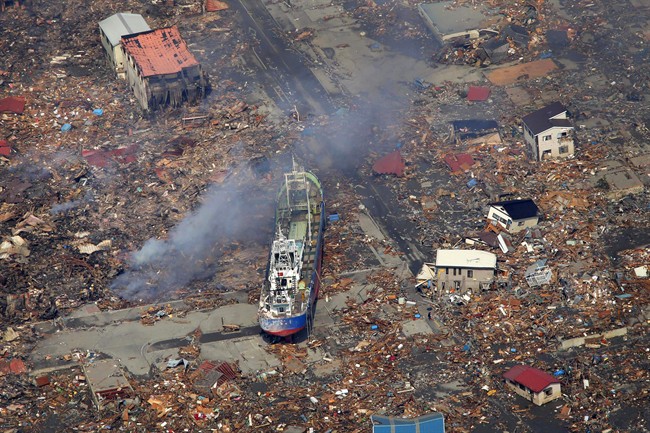A new report is suggesting Canada is not prepared to deal with the macroeconomic and fiscal consequences of a massive earthquake off the coast of British Columbia.

The report from the Conference Board of Canada says a large-enough earthquake would overwhelm the Canadian economy, leading to financial contagion that would delay rebuilding and result in additional long-term economic loss.
It also says the earthquake has the potential to cause widespread failure among insurance companies and trigger a domino effect across the financial sector.
It suggests insured losses that exceed $42 billion would surpass the level at which the industry is currently capitalized, and that a significant earthquake would result in $127.5 billion in total economic losses and approximately 15,000 deaths. The board estimates that the earthquake and fallout from financial contagion would reduce real Gross Domestic Product (GDP) by a cumulative $100 billion and would lead to what’s the equivalent of the loss of 43,700 jobs over the 10-year period.
READ MORE: Here’s a look at 5 of the largest earthquakes to strike B.C.
The report says the existing industry compensation mechanism created to protect policyholders would cause failures to snowball, triggering a chain of systemic financial contagion resulting in insolvencies across the industry and the broader financial service sector.
That will, in turn, delay the rebuild and recovery efforts by an estimated two years.
The board says real GDP losses peak at nearly $38 billion in the third year after the earthquake, and the rebuild effort would not contribute positively to growth until six years after the earthquake.
Deputy chief economist Pedro Antunes says the way things are right now, additional backstop measures need to be put in to protect the insurance industry and the financial sector more broadly, and the government can play a role in mitigating these economic and fiscal costs.
Antunes says it is important for Canadians, businesses and government leaders to understand that the current regulatory regime may not be able to protect the Canadian economy from a major disaster.
READ MORE: Experts say Vancouver Island will rip open like a zipper when overdue earthquake hits
The report comes on the heels of a 7.4-magnitude earthquake in Japan that triggered a tsunami warning on Monday and a 7.8-magnitude earthquake in New Zealand last week that produced thousands of aftershocks and killed two people.
Some experts believe British Columbia is overdue for a large-scale earthquake. Natural Resources Canada estimates the probability of a significant earthquake in Western Canada over the next 50 years at 30 per cent.
B.C. is also known as a hub of seismic activity, with the province having recorded half of the country’s largest earthquakes on record.
WATCH: A new article in the New Yorker says the next massive quake in the Pacific Northwest could be the worst natural disaster in North American history.
The last major earthquake to hit the province was a 7.7-magnitude quake that shook the Haida Gwaii region on Oct. 27, 2012. No deaths were reported and the tremor caused very little property damage.
The biggest earthquake to ever hit B.C. happened on Jan. 26, 1700. A 9.0-magnitude quake is believed to have struck B.C.’s Cascadia Subduction Zone; however, the technology did not exist to properly record the seismic activity. A tsunami generated by the temblor was chronicled in Japan and First Nations folklore suggests the tsunami destroyed an entire village on Vancouver Island’s Pachena Bay, leaving no survivors.
— With files from the Canadian Press




Comments